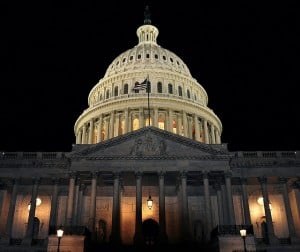So the U.S. government spends money, lots of money, and this money comes from a budget, which must be approved by Congress. When the political process is functioning and the two parties do this crazy thing called “working together”, Congress passes a fresh operating budget for the country in advance of the previous budget coming to an end.
But that isn’t what’s happening this year. So what is happening?
The House of Representatives actually has passed a continuing resolution that could go into effect on October 1st. But this isn’t going to happen because the Republican majority in the House added a provision to this spending bill that would defund the Affordable Care Act (Obamacare).1 The Democratic-controlled Senate and White House are not about to let this signature policy change fade away so easily.
It’s likely that the Senate will remove this defunding provision, pass the budget, and send it back to the House. At this point, the Representatives will have the options of passing the budget without the defunding of Obamacare or not passing a budget, thus causing a shutdown.
With no operating budget in place, the federal government will be forced to shut down. Among other things, this means the closure of national parks and monuments, no trash collection in Washington, DC, a delay in services such as processing passport applications and small business loans, no work and no pay for most non-security related federal employees, and work but no pay for all members of the military, including those currently deployed.2
As this debate continues over the next few days (at least until October 1st, when I assume they turn out the lights and play “Closing Time” by Semisonic on loop), I would encourage you to consider a few questions about the potential closure of the federal government.
The simplest question that can come to mind is, “How will this affect me?” If you or a loved one works for the federal government, lives or works anywhere near or connected to Washington, DC, or have plans of enjoying a fall weekend at a national park, museum, or monument, the impact is obvious.
What about the poor and marginalized? What does a government shutdown mean for our more vulnerable brothers and sisters? What might it mean for Medicaid payments to be processed more slowly? What about those lower-income federal employees with children to feed and few (or no) savings and assets to fall back on? What do these people do while they wait for our elected officials to work together and do their jobs?
Ideas and agendas are great talking points but have we lost touch with the world around us that calls forth from us empathy, sympathy, and solidarity? In the midst of the back and forth of political rhetoric, how can we stand with people who could otherwise be lost and forgotten?
– — – — –

